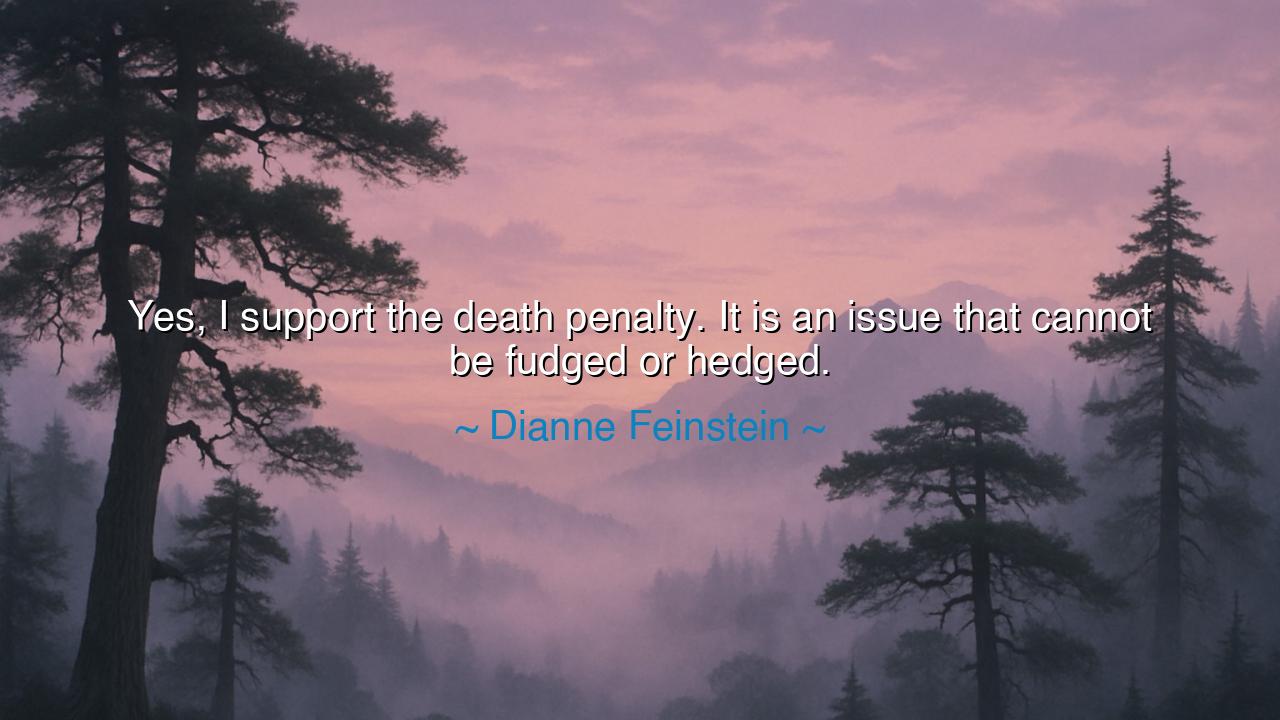
Yes, I support the death penalty. It is an issue that cannot be






In the firm and unflinching words of Dianne Feinstein, the ancient voice of conviction speaks anew: “Yes, I support the death penalty. It is an issue that cannot be fudged or hedged.” These are not the words of hesitation, nor of comfort—they are the echo of one who has walked the dark corridors of justice and gazed upon the raw face of human cruelty. In them resounds the age-old tension between mercy and retribution, between justice and compassion, between the desire to preserve life and the duty to protect the living. Her words summon us to a place of moral clarity, where one must take a stand without fear of scorn, without the refuge of ambiguity.
To “not fudge or hedge” is to reject the cowardice of indecision. It is to say: when confronted with the most terrible choices, a leader must speak plainly, for the lives of others depend upon her courage. Feinstein, who once governed the city of San Francisco during a time of bloodshed and upheaval, was no stranger to death. She saw firsthand the aftermath of violence—the loss that hollowed families, the fear that haunted communities. And from those experiences was born a resolve as cold and clear as tempered steel: that the state, as the guardian of its people, must at times bear the burden of ultimate judgment. Her declaration is not of triumph, but of grim necessity—the understanding that peace sometimes demands the hard enforcement of order.
The ancients, too, wrestled with this dilemma. In the old stories of Solon of Athens, the wise lawgiver faced the fury of his people when he refused to abolish death for certain crimes. “If we make all punishments equal,” he said, “men will commit the worst without fear.” Solon did not delight in punishment, but he understood that the stability of the city required it. Like Feinstein, he knew that justice must be decisive, not sentimental. For when justice falters, when leaders hedge in fear of disapproval, society itself begins to crumble, and the innocent become prey to the unrestrained.
Yet let us not mistake firmness for cruelty. Feinstein’s words are not a hymn to vengeance, but a call to responsibility. The power to take life, even lawfully, is a power no moral soul should wield lightly. It is the heaviest burden a leader can bear, for it tests the heart’s ability to remain just while walking through shadow. Those who sit in judgment must do so not with rage, but with sorrow, and with reverence for the sanctity of what they end. It is this solemn awareness that gives meaning to Feinstein’s clarity—she speaks not from passion, but from the weight of duty.
History reminds us how perilous such decisions can be. When Abraham Lincoln presided over the American Civil War, he faced the anguish of approving executions for desertion and treason. Many pleaded for clemency, yet Lincoln said, “I must balance mercy with the safety of the many.” He spared where he could, but acted when he must. He understood, as Feinstein did, that leadership demands not purity of heart, but strength of will. The measure of justice lies not in its gentleness, but in its steadiness—in the leader’s ability to discern when mercy serves life, and when firmness preserves it.
So too must the children of the future learn this ancient lesson: that moral conviction is not the absence of compassion, but its refinement through wisdom. To fudge or hedge is to betray both truth and responsibility. Whether one agrees with Feinstein or not, her declaration teaches the sacred art of clarity in conviction—to know one’s beliefs, to stand upon them even in the storm of opposition, and to bear the consequences of that stand with dignity.
Thus, let this teaching be carved in the tablets of conscience: when faced with grave matters, speak plainly. Do not seek refuge in vagueness, nor disguise uncertainty as compassion. The world honors those who choose and bear the weight of their choice. Whether your path is of justice or mercy, tread it with eyes open, heart steady, and spirit unyielding. For it is not the choice itself that defines greatness, but the courage to make it when all the world trembles in hesitation.
In the end, Dianne Feinstein’s words are not merely about law or punishment—they are a mirror held to every soul who must one day choose between right and easy. Her voice, like that of the ancients, reminds us: clarity is strength, conviction is honor, and leadership, at its truest, is the willingness to act when others would remain silent.






AAdministratorAdministrator
Welcome, honored guests. Please leave a comment, we will respond soon